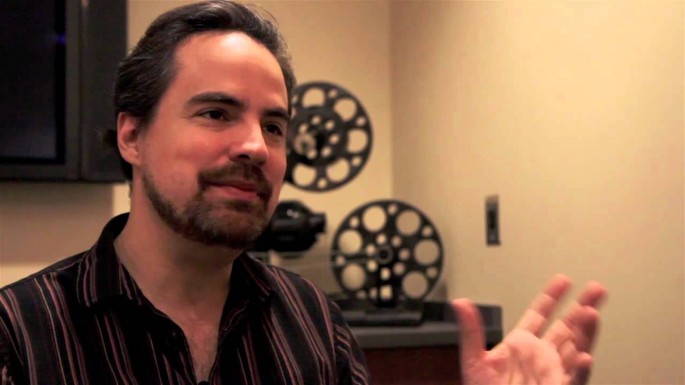
Director of “Sleep Dealer” Alex Rivera led students in a semester-long filmmaking course exploring environmental futures.
Last night, UW-Madison’s Artist in Residence Alex Rivera led a showcase of student-produced short films before a gathered audience in Science Hall. Over an hour in its entirety, the presentation served as the culmination of Rivera’s class “From Ecotopia to Ecopocalypse: Telling Digital Stories About the Environment,” a semester-long endeavor providing students with means of expressing environmental change and concern through film. As the Sleep Dealer director reiterated before the films began, Rivera challenged his students specifically through science-fiction narratives in envisioning possible future environments; the decision was a conscious step away from what the director described as the far more “immediate” documentary form. The same outward gaze was reflected this November in the Nelson Institute’s “Tales from Planet Earth” Film Festival and its own overarching theme of “futures.” Some “Planet Earth” films were even preceded by the student’s shorts, although many have been extended and re-edited in the weeks since.
Several films used science-fiction to present inward, even transcendent experiences. Narrated by a nameless voice over, one short finds a young woman recalling fond memories of a moon-based agricultural outpost. Another, directed by Christopher Limburg, puts its narrator under the knife as a test subject in an experimental nanobot procedure. Once sedated, the young man’s entire consciousness is enveloped by a transformative out-of-body experience, made all the more dazzling through Limburg’s kaleiodoscopic overlaps of shots of planet life. Abruptly regaining consciousness in the middle of a forest, the man finds himself alone yet strangely at peace with his new, natural surroundings.
Other projects explored more pessimistic subjects. In one imagined future, bees are brought to the brink of extinction, rendering any colonies outside of government control illegal. Amid the dystopian anxiety however is a warm center, where one man’s “outlaw hive” pollinates a crop of fruit. A resulting strawberry crumble provides a warm, nostalgic center at the heart of the film’s cold exterior. “Dash Dinkler: Robot Hitman” finds its android character immune to human empathy yet consumed by a preoccupation to conserve resources to an extreme degree. Ming Hua told her story “Two Planets” through a pair of short films. The first finds a corporate drone discovering his own desiccated planet has been powering an experimental colony on another. After discovering a kind woman among the experiment planet’s development, the protagonist escapes his confines and attempts to find her.
Among the standouts was Nina Ham’s “Do As Told!” Fusing existing media with footage shot here in Madison, Ham uses cultural elements from the present in constructing her immediate future, including clips of speeches from George W. Bush and Barack Obama and even borrowing Kanye West’s College Dropout “skit” on the financial return of a higher education. Ham layers these touchstones over scenes of drunk passersby on State Street, “Freak Fest” attendees, and stuttering lights of Madison police cars. Contrary to her colleagues, Ham’s vision of a not-so-distant future works via familiarity, anticipating the escalating debt of a more collegiate “climate.” LuLu Maslowski’s “Necessity” was among the most beautifully photographed projects. Visiting a college campus in the wake of an oil crisis, “Necessity’s” world is dominated by resource constraints, where everyone must wear an energy band denoting their monthly allotment of power. Bicycles and pedestrians have become the transportation status quo, reducing gas-guzzling cars to mere “driveway ornaments.” Maslowski’s premise feels particularly prescient, and she localizes her narrative’s scope via an intrepid college student’s impending phone interview, beautifully illustrating how even the smallest amount of power can mean so much to one person.
